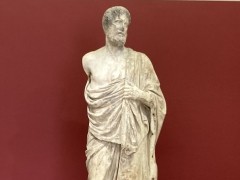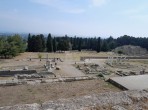Hippocrates, father of modern medicine

Hippocrates, the most famous physician of ancient Greece, also known as the founder of modern medicine, was born and worked on the Greek island of Kos. He established medicine as a scientific discipline based on observation and subsequent treatment. Also associated with Hippocrates' teachings is a large collection known as the Hippocratic Corpus and a medical oath known as the Hippocratic Oath.
The life and teachings of the physician Hippocrates
In an attempt to map the personal and professional life of Hippocrates, historians rely primarily on a biography written some 500 years after Hippocrates' death by another Greek physician, Soranus, as well as a collection of medical writings, the so-called Hippocratic Corpus. Because of the lack of direct sources, it is often difficult to separate fact from legend, but most treatments of Hippocrates agree on the following.
Hippocrates Asclepiades probably lived between 460 and 377 BC and devoted his entire life to medicine. He was born on the island of Kos into a wealthy family with a medical tradition. He learned from his father, Heracleides, and probably from his father Hippocrates, who practiced medicine at the local Asclepion, a medical centre dedicated to the god Asclepius. The art of medicine was hereditary at this time and passed from father to son within the limited circle of the Asklepiades family. It was on his father's side that Hippocrates was supposed to be a descendant of Asclepius himself.
The basic knowledge Hippocrates had acquired in the family was further expanded through his studies at the Asclepian medical phallic school on Kos, as well as through numerous meetings with nutritionists, sophists and philosophers. During his travels he also visited Thassos, Thrace, Macedonia, and perhaps Egypt, and gathered a wealth of information about nature, climate, the way of life of the inhabitants of each region, their diseases, and the effect of the environment on the people. His great advantage was thus a wider education beyond medicine.
Basic ideas of Hippocratic medical theories
Enriched by his travels, Hippocrates returned to the island of Kos and took over the medical school on Kos, where he began to teach. He rejected the traditional idea that "disease is divine punishment", instead turning to Mother Nature and natural processes for healing. He believed in careful observation of patients and the manifestations of their illnesses, on the basis of which he proposed specific methods of treatment. Hippocrates also stressed that the physician must take into account not only the patient's current condition at the time of examination, but also his entire course and quality of life to date.
Doctors of the Hippocratic school had to keep detailed records of their observations and treatment methods on a case-by-case basis, as Hippocrates believed that these records would be very useful to future generations of physicians. In this way Hippocrates laid the foundations of clinical medicine. After mmoha years of observation, he came to the conclusion that diseases could be caused by heredity in the family, the influence of the natural environment, lifestyle or dietary habits. Hippocratic medicine was based on a healthy diet and physical exercise as prevention against health ailments.
According to Hippocrates, illness was the result of an imbalance of the four basic bodily fluids - blood, black bile, yellow bile and mucus. The aim of treatment was thus to restore this balance. Hippocrates also developed a theory that we would nowadays classify as homeopathy, as he argued that the human body has the power to heal itself and restore the balance of the four senses. He recommended complete rest for patients and also used natural balms and extracts for healing. He also paid great attention to sterility in medical procedures.
Although Hippocratic medicine believed that disease was caused by natural processes (not divine will), it lacked a firm grasp of the nature of what causes a particular disease. Physicians of the time only observed sick people, not the diseases themselves. Also, the description of internal organs was based on what could be seen or felt externally. In fact, Greek ethics in the 5th century forbade human autopsies, but animal autopsies were performed.
Hippocrates closely linked medical science with philosophy, arguing that a good and competent physician must be capable of self-reflection. Thus, according to Hippocrates, a physician should be patient, kind, and perceptive. Hippocrates often said: "A physician should help, or at least not harm."
The famous physician Hippocrates
The fame of Hippocrates spread quickly. During the Peloponnesian War, he was called to Athens to rid the city of a deadly plague. He discovered by observation that blacksmiths working by the fire all day did not fall ill with the plague. So he had large fires lit in the city to disinfect the air and stop the plague from spreading further. In gratitude to the Athenians, Hippocrates was made an honorary citizen and given a golden crown. But he also showed courage when he refused to render his services to the Persian king Artaxerxes, whose army was being reduced by the plague. King Artaxerxes first offered Hippocrates a rich reward and parity in status with the Persian aristocrats, then sent a threatening letter to the inhabitants of Kos that he would destroy their cities and the entire island if they did not bring Hippocrates. The inhabitants of Kos, however, stood up for their physician and refused to succumb to the Persian king's threats.
Hippocrates left Kos at an advanced age and moved to Thessaly. Not much is known about his death, but many historians believe that Hippocrates lived to a ripe old age and died around 377 BC in the ancient Greek city of Larissa.
The Hippocratic Corpus and the Hippocratic Oath
The extensive teachings applied within the Hippocratic school of medicine have been collected into the famous so-called Hippocratic Corpus. The Hippocratic Corpus is a large collection of 60 medical books written by Hippocrates, his pupils and followers of his teachings, containing treatises in the spirit of Hippocratic medicine. The books and texts cover many different aspects of medicine, from Hippocrates' medical theories, to the description and treatment of particular diseases, to the ethics of medical practice itself. One part of the collection is the Hippocratic Oath, which still serves as a moral guide for trained physicians today. Much credit for the preservation of the collection goes to the famous Library of Alexandria.
Hippocrates kept the tradition of medicine in the family and passed on his medical knowledge to his two sons. However, thanks to the medical school on Kos, he significantly expanded the number and circle of physicians beyond the traditional family ties. After Hippocrates until the end of the classical period, many physicians from Kos stood out.
Did you visit this place and do you have some additional informations, interessting observation or photos?






